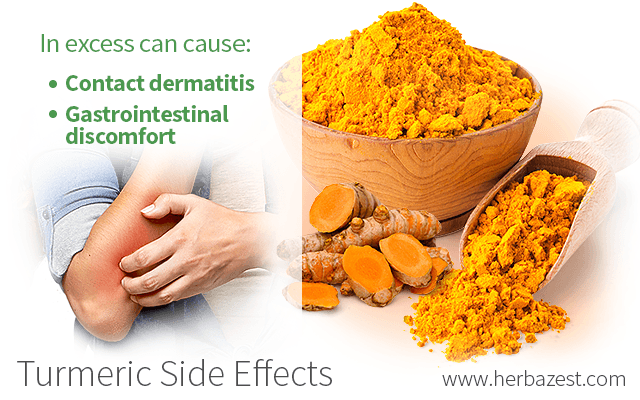Although turmeric is a well-known medicinal herb, some people may wonder whether they may experience side effects after its consumption. It is necessary to stay up-to-date with the latest scientific findings - many of which do not observe the effects of turmeric for any longer than a six-month period.
Most Reported Side Effects of Turmeric
Current studies on turmeric are focused on its active compound curcumin, which is believed to be the main source of its medicinal actions. Turmeric appears to be a safer, non-habit-forming alternative to many other pain relievers and anti-inflammatory drugs. However, some of the following turmeric side effects have been reported:
Contact dermatitis. Although turmeric has been proven to possess very effective anti-inflammatory and antioxidant health benefits, one side effect of turmeric is that its curcumin may also act as an allergen in some individuals.
Dermatological problems stemming from contact with certain spices has been widely reported. In its powder form, for example, turmeric spice has triggered side effects in patients whose occupations are associated with the industry. A 64-year-old man working as a miller in a spice shop exhibited dermatitis on his hands, forearms, and feet after his sensitivity to turmeric was potentiated through airborne dust as a result of milling. Similar effects were noted in the case of a 59-year-old female patient treated for an allergic reaction to curcumin being used as a food coloring agent at the pasta factory where she worked.1
Numerous other individual case studies on the dermatological side effects turmeric produces have been cited. They usually involve contact with turmeric spice, topical creams, cosmetic treatments, and other sources of curcuminoids. They are characterized by hyperpigmentation, scaling, redness, swelling, dryness, and other forms of inflammation on the skin.
Gastrointestinal upsets. In a clinical trial, 44 smokers were treated with varying levels of curcumin over a 30-day period.2 Though the majority reported no adverse side effects, some patients treated with high doses of up to eight grams per day for two weeks registered abdominal pain. In the same study, however, two-gram and four-gram doses were well-tolerated.
Instances of nausea and diarrhea were found in a dose-escalation trial, where 15 colorectal cancer patients were administered turmeric capsules with curcumin doses of 0.45 - 3.6 grams per day for up to four months.3
While the use of turmeric for liver health is fairly popular, and no human cases of liver problems have been reported due to its consumption, high doses of turmeric have triggered liver complications in animal testing.
Turmeric Cautions and Interactions
Turmeric may interact with other drugs and herbal supplements, or yield adverse effects in those suffering from certain medical conditions.
Turmeric Cautions
Gallbladder diseases. People suffering from some gallbladder diseases may need to limit their consumption of turmeric or avoid it altogether, since it may exacerbate the symptoms.
Reproductive complications. Though commonly used to treat period cramps and to encourage fertility, no substantial research has been done that would support turmeric's safety and effectiveness for the treatment of ailments related to the female reproductive system.
Children and pregnant women. While safely consumed in culinary doses, turmeric is not yet recommended for children and pregnant women as a medicinal treatment. Prior clinical research targeting these groups specifically in order to assess turmeric's health risks has not been performed.
Turmeric Interactions
Certain herbal treatments known for their antiplatelet activity can interact with non-steroidal anti-inflammatory drugs (NSAIDs) to heighten the risk of bleeding. Turmeric is no exception. It has been known to interact with some NSAIDs, particularly aspirin.
Turmeric may also interact with acetaminophen, producing similar anticoagulant results. However, the majority of the reported findings on turmeric's possible interactions have been based on individual case studies and preclinical data not gathered from human research.
Turmeric is a safe, non-toxic form of treatment for many adults. While current scientific data on the side effects of turmeric have outlined minor upsets and certain other interactions, it is important to remember that these will vary from person to person. Further research is needed to assess appropriate doses and the effects of turmeric over long-term use.
Sources
- Journal of Clinical Pharmacy and Therapeutics, Herbal medication: potential for adverse interactions with analgesic drugs, 2002
- NCCAM Herbs at a Glance, Turmeric
Footnotes:
- Journal of Clinical and Aesthetic Dermatology. (2015). Curcumin, A contact Allergen. Retrieved August 31, 2016, from: https://www.researchgate.net/publication/286156028_Curcumin_A_Contact_Allergen
- Cancer Prevention Research. (2011). Phase IIA Clinical Trial of Curcumin for the Prevention of Colorectal Neoplasia. Retrieved August 31, 2016, from: https://cancerpreventionresearch.aacrjournals.org/content/4/3/354.short
- Clinical Cancer Research. (2004). Phase 1 clinical trial of oral curcumin: biomarkers of systemic activity and compliance. Retrieved August 31, 2016, from: https://pubmed.ncbi.nlm.nih.gov/15501961/




